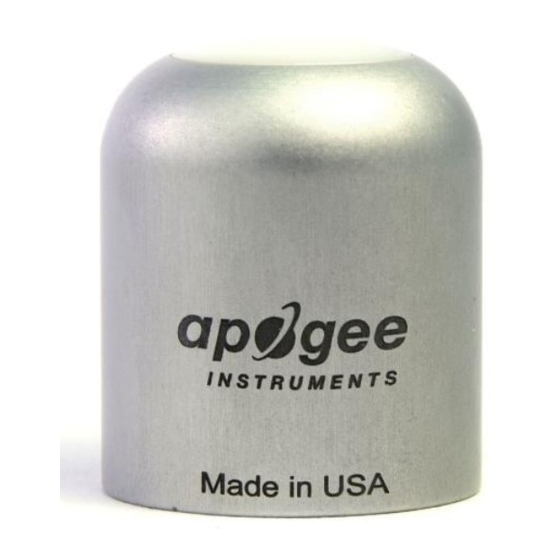
Apogee Instruments SQ-610 Owner's Manual
Hide thumbs
Also See for SQ-610:
- Owner's manual (18 pages) ,
- Owner's manual (18 pages) ,
- Owner's manual (24 pages)
Table of Contents

Summary of Contents for Apogee Instruments SQ-610
-
Page 1: Owner's Manual
OWNER’S MANUAL EPAR SENSOR Models SQ-610 Rev: 4-Jan-2022 APOGEE INSTRUMENTS, INC. | 721 WEST 1800 NORTH, LOGAN, UTAH 84321, USA TEL: (435) 792-4700 | FAX: (435) 787-8268 | WEB: APOGEEINSTRUMENTS.COM Copyright © 2022 Apogee Instruments, Inc. -
Page 2: Table Of Contents
TABLE OF CONTENTS Owner’s Manual ....................................1 Certificate of Compliance ................................. 3 Introduction ..................................... 4 Sensor Models ..................................6 Specifications ................................... 7 Deployment and Installation ..............................10 Cable Connectors ................................... 11 Operation and Measurement ..............................11 Maintenance and Recalibration ............................. 15 Troubleshooting and Customer Support .......................... -
Page 3: Certificate Of Compliance
RoHS 3 compliant using exemption 6c. Further note that Apogee Instruments does not specifically run any analysis on our raw materials or end products for the presence of these substances, but we rely on the information provided to us by our material suppliers. -
Page 4: Introduction
SQ-600 series ePAR sensors are designed for continuous photon flux density measurements in indoor or outdoor environments. SQ-610 models output an analog signal that is directly proportional to photon flux density. The analog signal from the sensor is directly proportional to radiation incident on a planar surface (does not have to be horizontal), where the radiation emanates from all angles of a hemisphere. - Page 5 Murakami et al. 2018. A Mathematical Model of Photosynthetic Electron Transport in Response to the Light Spectrum Based on Excitation Energy Distributed to Photosystems. Plant Cell Physiology. 59(8): 1643–1651. Zhen and Van Iersel. 2017. Far-red light is needed for efficient photochemistry and photosynthesis. Journal of Plant Physiology.
-
Page 6: Sensor Models
SENSOR MODELS This manual covers the unamplified model SQ-610 ePAR Sensor (in bold below). Additional models are covered in their respective manuals. Model Signal SQ-610 Self-powered SQ-612 0-2.5 V SQ-614 4-20 mA SQ-615 0-5 V SQ-616 SQ-617 SDI-12 SQ-618 Modbus A sensor’s model number and serial number are... -
Page 7: Specifications
4 years against defects in materials and workmanship Calibration Traceability Apogee Instruments SQ-600 series ePAR sensors are calibrated through side-by-side comparison to the mean of four transfer standard sensors under a reference lamp. The transfer standard sensors are recalibrated with a... - Page 8 Spectral Response Mean spectral response measurements of four replicate Apogee SQ-600 series ePAR Sensors. Incremental spectral response measurements were made at 10 nm increments across a wavelength range of 370 to 800 nm in a monochromator with an attached electric light source. Measured spectral data from each quantum sensor were refined and normalized by comparing measured spectral response of the...
- Page 9 Cosine Response Directional, or cosine, response is defined as the measurement error at a specific angle of radiation incidence. Error for Apogee SQ-600 series ePAR Sensor is approximately ± 2 % and ± 5 % at solar zenith angles of 45° and 75°, respectively.
-
Page 10: Deployment And Installation
An Apogee Instruments model AL-100 leveling plate is recommended for this purpose. To facilitate mounting on a cross arm, an Apogee Instruments model AM- 120 mounting bracket is recommended. -
Page 11: Cable Connectors
CABLE CONNECTORS Apogee sensors offer cable connectors to simplify the process of removing sensors from weather stations for calibration (the entire cable does not have to be removed from the station and shipped with the sensor). The ruggedized M8 connectors are rated IP68, made of corrosion-resistant marine-grade stainless-steel, and designed for extended use in harsh environmental conditions. -
Page 12: Operation And Measurement
In order to maximize the measurement resolution and signal-to-noise ratio, the signal input range of the measurement device should closely match the output range of the ePAR sensor. Wiring for SQ-610 White: Positive (signal from sensor) Black: Negative (signal from sensor) - Page 13 Sensor Calibration Apogee unamplified SQ-610 ePAR Sensors have standard calibration factors of exactly: 100 µmol m per mV Multiply the calibration factor by the measured mV signal to convert sensor output to photon flux density in units of µmol m Calibration Factor (100 µmol m...
- Page 14 Apogee SQ-610 series ePAR sensors have an immersion effect correction factor of 1.25. This correction factor should be multiplied by PPFD measurements made underwater to yield accurate PPFD.
-
Page 15: Maintenance And Recalibration
3. Salt deposit accumulation from evaporation of sea spray or sprinkler irrigation water. Apogee Instruments upward-looking sensors have a domed diffuser and housing for improved self-cleaning from rainfall, but active cleaning may be necessary. Dust or organic deposits are best removed using water, or window cleaner, and a soft cloth or cotton swab. -
Page 16: Troubleshooting And Customer Support
TROUBLESHOOTING AND CUSTOMER SUPPORT Independent Verification of Functionality Apogee SQ-610 ePAR Sensors are self-powered devices and output an analog signal proportional to incident photon flux density for the 383-757 nm ± 5 nm wavelength range. A quick and easy check of sensor functionality can be determined using a voltmeter with millivolt resolution. -
Page 17: Return And Warranty Policy
RETURN AND WARRANTY POLICY RETURN POLICY Apogee Instruments will accept returns within 30 days of purchase as long as the product is in new condition (to be determined by Apogee). Returns are subject to a 10 % restocking fee. WARRANTY POLICY... - Page 18 84321, USA 5. Upon receipt, Apogee Instruments will determine the cause of failure. If the product is found to be defective in terms of operation to the published specifications due to a failure of product materials or craftsmanship, Apogee Instruments will repair or replace the items free of charge.
















Need help?
Do you have a question about the SQ-610 and is the answer not in the manual?
Questions and answers